Head (Davy, Micky, Mike, Peter Commentary) Script
(0:00:02) Mike:
Hello, and welcome to the movie Head, which we are about to watch together. This is Michael Nesmith. I was… in the band. I was actually one of the Monkees.
(0:00:14) Micky:
Hi! I’m Micky Dolenz, and you’re about to watch the movie Head.
(0:00:18) Mike:
We’ll have a whole Head-fest.
(0:00:21) Davy:
Hey, this is Davy Jones here, and we’re watching a movie that, uh, Micky, Mike, Peter, and myself first thought of and was written in 1968. So… sit back, enjoy, and if you understand it, please write me a letter and tell me.
(0:00:38) Peter:
Hi, this is Peter Tork. I… work in this movie. I — you’ll see me there, uh, from time to time, and, uh, this is me commenting on a mic. First interaction with Bert and Bob (Schneider and Rafelson), first thing I, uh, after I got the call from Steve Stills and called the office, and they told me when and where to show up. I took a bus from Huntington Beach all the way up to Hollywood, and thinking I had an “in”, I was a little surprised to find myself walking into a cattle call. Uh, next thing I knew, I went into Bert’s office and, uh, his feet were up on his desk. I put my feet up on his desk. He offered me a cigarette. I said, “I don’t smoke those.” He said, “Well, you know, you can’t be stoned on the set.” I said “Yeah, I think, I — oh, okay. Uh huh.” Nudge nudge, wink wink. And as far as I know, the process was if you didn’t get stopped by one of these two guys, you went to see the other.
(0:01:36) Mike:
I was a complete kid with no experience whatsoever in the motion picture business, and, uh, so they wanted me to come and do a screen test. They wanted me to sing some songs. They wanted me to do some things, and so, I just, I just did. Bob, Bob led me through questions and was a very supportive environment that I recall, and I was, uh, you know, really nervous, uh, about what I was supposed to be doing. I didn’t… have any touchstone for acting. I mean, I’d done a little theater work, but certainly nothing in motion pictures. I didn’t understand how a studio worked, I didn’t understand how a camera worked, any of those things, and Bob was really helpful. I mean, I felt comfortable in, in that he was in his element, so I felt fine kinda bouncing around.
(0:02:25) Micky:
Well, I remember my first meeting with Bert and Bob quite well actually, because I had been, um, called by my agent, who said, “You have a pilot audition.” That year, 1965, and I’d actually been up for a couple of pilots already that year. So I went down to old Columbia Studios around Gower, and I walked in, uh, to the interview, and I swear I thought Bob and Bert were there also for the audition. They were both in jeans and t-shirts, and, um, I was used to going into interviews for televisions shows, of course, with sixty, sixty-five year old producers in suits and ties, and here’s these two guys, laid back, and the place was a mess. They had like empty pizza boxes and paper cups and… anyway, it became apparent very quickly that they were the producers of the show. And I, you know, I remember reading, um, a little bit from a, a pilot script — which I still have, actually, original copy, with “Monkees” spelled with a Y still. PlayBut I went in for a private audition, because I’d already had a series, you see. So one did not go to a cattle call when one had its own series when one was younger.
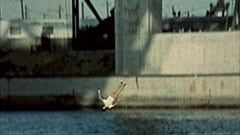
[Movie: Micky jumps off the bridge and flies through the air.]
(0:03:35) Micky:
There I go. That’s me on a trampoline going up and down. That was processed, and then the long shot is one of our, uh, roadies who we sacrificed for that fall. But we gave him a lovely service. But what a guy to like, you know, step up to the plate like that. [Micky laughs.]
[Movie: “Porpoise Song” starts.]
(0:03:58) Micky:
And, now starts one of my favorite songs of all time. And I think it’s one of the greatest rock-pop songs ever written.
(0:04:13) Peter:
And we begin with the “Porpoise Song”, um, which was released, uh, by, on Colgems, and died. The record just went straight to the bottom with a bullet, uh, with an anvil. [Peter laughs.] Went to the bottom with an anvil, as did the movie, as we know.
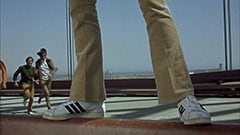
(0:04:34) Davy:
Even though, you know, some people would say, “Oh my goodness”, you know. “It’s, it’s pretty suicidal.” But maybe that was the whole theme of the movie; we were kind of destroying an image that we had created. Much the same as the Beatles going off to India and being involved with a higher…. source, you know, and a higher energy.
(0:04:56) Mike:
You know, I mean, the overall notion was, you know, let’s kill the critter before it gets, you know, any further. Let’s get it back in the box and kill it. And, that’s what they did. That’s all I know it was about. But I mean, I’m sure there was a lot of other things, too.
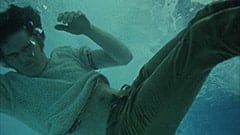
(0:05:12) Micky:
Now this is all taking place in the Bahamas, where, um, Jack (Nicholson) and I, just the two of us — Jack did the second unit, uh, filming on this — and it was just the two of us. And it was a little bit scary, because, um, we just drove this little boat out and found this really nice little — it wasn’t that deep, I don’t think, but I mean, it was deep enough to drown — and then we had these two girls from the local, I guess, Nassau, Bahamas water world show or something [Micky laughs], where they, they were mermaids. And I literally — they’ve strapped weights around me so I would sink — and I had to jump off this little boat and, and sink until — and hold my breath — until I could no longer hold my breath, and then I would frantically wave, and I — you know, it was hard to see, I could see a little bit underwater — ’cause they had two, I think they had two scuba guys down there hiding behind the coral or the rocks or off-camera, and I, Play[Micky laughs] and then the deal was — you could never get away with this now — the deal was I would just wait until I was running out of breath, and then I’d go wehwuHWEHHHH, and these two guys would swim as fast as they could at me, and I clearly remember just all I saw was this mouthpiece, this silver mouthpiece to the scuba diving equipment, and I would go huu-huu-huu, and I’d get back up to the boat, and Jack would say, “Okay, one more time!”
(0:06:37) Mike:
Well, the script came about from, um, the suggestion by… well, I dunno, Bob, Bert, maybe, maybe Nicholson, that we all just kind of go up to Ojai and, um, sit around and, uh, just, uh, spin yarns and tell tales and reminisce and go over stuff about, you know, how things had transpired and see what ended up on tape, which they were gonna tape the whole thing. So we did that. We just kind of sat around, and we tried to tell jokes and, and so forth, and… but you know, I don’t recall the four of us contributing that much. I mean, by that time, you know, we were a pariah. And not only as a, as an entity — as the Monkees as an entity, it had just gone completely wrong in the social fabric of the times — but also individually. You know, we had, we had emerged into these four little preening monsters, who, um, I think, if they could have really killed us, they would have. [Mike laughs.] But at least they could, uh, cinematically do us in. And, um, and I don’t blame ’em. I think I probably would have done the same thing. You know, I go back over those moments, and I’m just mortified by some of the lunacy that was going on there.
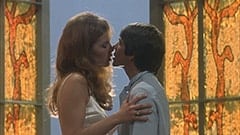
[Movie: Lady Pleasure kisses Davy.]
(0:07:56) Davy:
PlayThe doves started flying, and the wind started blowing, and… kind of funny, don’t you think? See who kisses the best. That’s Jack Nicholson’s girlfriend, Mimi (Machu, credited as I.J. Jefferson)… PlayOoh! I just kissed Jack.
[Movie: Lady Pleasure says, “Even.”]
(0:08:16) Peter:
“Even.” None of us kissed any better than the others. So. Play“Wanna come back later when the guys are not…” [Peter laughs.] “Are you kidding? Are you kidding?” Do you think I would have anything to do with any one of you? I don’t even know why I came over here.
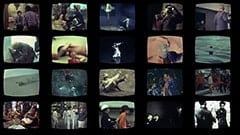
[Movie: “Ditty Diego” starts.]
(0:08:43) Micky:
But this is a great sequence. I mean, this is one of the coolest things Jack wrote. We, we do this on stage too when we go out as the Monkees. Very often, we’ll do it. And we’ve done it as a rap. [Micky puts on a rapping voice.] Play“Hey, hey, we ARE the Monkees! You know we like to PLEASE! A manufactured image, with no philosoPHIES!” I guess it was kind of an early rap tune, wasn’t it?
(0:09:09) Davy:
It’s sort of like, you know, white rap. [Davy laughs.] You know, was it the first time you’d heard it? Who knows.
[Movie: During the “Ditty Diego” sequence, the screen is filled with boxes showing different shots from the movie.]

(0:09:18) Davy:
Um… was this pre-Brady Bunch? [Davy laughs.]
[Movie: The sequence ends with real life footage of Nguyễn Ngọc Loan executing Nguyễn Văn Lém during the Vietnam war.]
(0:09:33) Davy:
And this is what stopped — that particular picture — was what stopped the movie from being shown to a general audience, because they wouldn’t take it out. That one little thing at the end, you know? Um, you know, I mean, I’d always thought the Monkees were gonna make a, a movie similar to our show: a lot of fun, a lot of, sort of like, you know, Chevy Chase on a summer holiday or… you know. Sorta Beach Blanket Bingo, you know, or whatever they called it, you know, with Sandra Dee and Bobby Rydell and all that. But no, we took the, um, the events of the time, which we’d been asked not to talk about. Drugs, we never talked about. Political opinions, we never talked about. And here, all of a sudden, it’s like the top gets off the bottle, and all this comes out.
(0:10:30) Micky:
Well, the guy being executed in Vietnam had already, of course, been on the news a million times, so that wasn’t new to anybody. It might have been a little bit shocking, of course, to our fans. And funnily enough… but, I had a girl walk up to me once, just after the movie was released, in a, in a, uh, car wash, and I remember it clearly, because it’s the car wash where I grew up. She came up, almost with tears in her eyes, and she says, “How could you do that in the movie? How could you promote war like that?” And I was stunned. I, I thought, “How in the world can someone misinterpret this as being, you know, pro-war?” Especially when you’re seeing that guy get his head blown off thirty times. I mean, how could you possibly make that mistake? But of course, you know, the thing about the movie was that there was, our, our youngest fans, I don’t even think could get in, and of course, the older people who didn’t like the Monkees anyway didn’t see it, didn’t want to watch the movie anyway, so. Kind of fell between two stones.
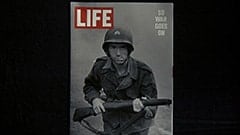
[Movie: Peter is on the cover of Life magazine.]
(0:11:35) Peter:
Bert tried to get Life magazine to okay that they used this, me on the cover of Life magazine. Life magazine said, “No.” Bert said, “Do it anyway.” An example of Bert’s daring and audacious style of doing business.
[Movie: Peter encounters Private One.]
(0:11:56) Peter:
Here we are, confronting the great hall of fame linebacker Ray Nitschke, who, um, was, uh, a sullen and self-contained guy on the set when you talked to him. You just, you couldn’t talk to him. He was just very, very dour and serious.
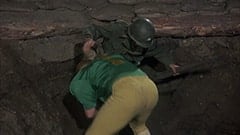
(0:12:15) Micky:
Boy, he’s nailing Peter there too, you know.
[Movie: Peter says, “Mr. One?”]
(0:12:19) Micky:
[Micky laughs.] “Mr. One.” Peter, Peter really, uh, took that well.
(0:12:30) Davy:
Ray Nitschke, uh, you know, you look at this guy now, I mean, he was a mean, mean machine. I mean he’s half the size of half the guys that are players these days.
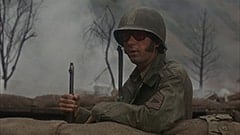
[Movie: Mike says, “He’ll never make it past this intense bombardment… nobody could.”]
(0:12:43) Micky:
[Micky laughs.] Mike had a great character, and the way he played this was really cool. [Micky laughs.] That’s one of my favorite lines.
(0:12:54) Micky:
This is in the world-famous Bronson Canyon, where I had already filmed here, maybe twenty times, in Circus Boy [Micky laughs] and other little episodes of Cannon (Micky would appear in Cannon after the Monkees.) and Mr. Novak or Peyton — and I can’t remember the shows, but I’d filmed in Bronson Canyon, and I remember going to see my dad film a movie in Bronson Canyon in like the ’50s. Very famous place to shoot.
(0:13:31) Davy:
Little story about this is that during this period of time, when we shot this movie, at the airport, I hooked up with four soldiers that were going off to, um, Vietnam, and just recently, I, I met one of them. Gave me a t-shirt with a picture of the four of them and me on it. I’d given them records before they left. They played them through their term over there, and even kept the picture all those years, forty years later.
(0:13:47) Peter:
Well, we all used to, uh, uh, a, uh, I don’t wanna say a dodge, but we all, uh, used a protocol or, uh, of one sort or another. I walked into, um — I circled that I’d been arrested. They sent me to a therapist, and I knew from just a minute with him that he didn’t know beans about anything, so I just acted crazy, and they gave me, I think 1Y was the classification. “Unlikely to be called”, I think was what that means, “except in extreme emergency”.
[Movie: “Circle Sky” sequence.]
(0:14:24) Mike:
To me, it’s a very interesting piece of footage, because, by that time, we had actually coalesced into a band. We could play, well. And what you hear on the film is that. You know, when you look at that footage, you’re watching the Monkees in concert. And that’s probably the only three minutes of us really playing in concert ever. Because all the way up to then, we were just fighting our way along, you know, trying to figure out — ’cause we were a garage band at that point. Except we were filling up these stadiums, so, it was hard, and we couldn’t hear, and we, you know, we couldn’t — nobody wanted to rehearse, and… so it was, it was, it was very, very tough. We were hiding a lot behind the, the, the event, and the screams, and all the stuff that went on with it. But with “Circle Sky”, we had to do it over and over and over and over, because we were live and filming, and, um, I think somebody, maybe Bob or somebody, said, “No, this has gotta be live. This has gotta be the real thing.” So, that’s, that’s what happened. And we were, you know, we were good enough to just play exactly what you heard. Now, you know, in the annals of rock, does “Circle Sky” belong in the pantheon? [Mike laughs.] Just a crash-burn rock and roll song informed by its time.
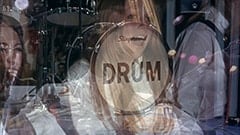
(0:15:41) Davy:
I do happen to have the drum head that says “DRUM” on it, on, from the front of Micky’s drum, which will be displayed in, um… in my Pennsylvania memorabilia museum.
(0:15:53) Micky:
PlayAnd by the way, it was my idea to come up with the word “DRUM” on the drum head, in my, uh, little silly, uh, Monkee-esque brain.
(0:16:03) Micky:
I loved playing drums on this, probably better than almost any other song. It just rocks. It’s such a great tune. I gotta tell you, Mike Nesmith, “Circle Sky”, you listen to some of the new stuff coming out of Nashville, that electro-rock stuff… PlayMike Nesmith was doing this stuff forty years ago.

[Movie: The crowd rips apart mannequins of the Monkees.]
(0:16:22) Micky:
Obviously… that’s not us… [Micky laughs] that they’re tearing apart. We ran off stage, and I do remember a couple of kids got hurt, because when we ran off, they didn’t have a lot of security, because they didn’t want it to look like there was security.
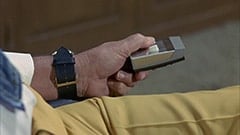
[Movie: Victor Mature flips through channels on the TV.]
(0:16:37) Peter:
And now, we begin the channel roaming, and we’re introduced to Victor Mature as the person in charge of all of this. We are just a thing being watched, as we begin to find out.
(0:16:51) Micky:
It’s a very abstract movie, and, you know, Jack is probably about the only one that could really give you, you know, the motivations and the inside, um, you know, line on, on what some of this meant to him, but it was obviously a deconstruction of, not just the Monkees, but of Hollywood in general, and it was the beginning of that era, you know, uh, where it was the anti-hero, it was the deconstruction of classic Hollywood cliché, you know.
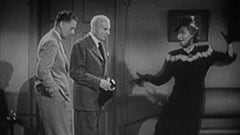
(0:17:20) Davy:
This is one of my favorite spots, when this girl dances. You looking for her dancing? Okay. Listen. [Davy laughs.] Oh really, Jam Session, that’s so cool.
(0:17:33) Mike:
My own sensibility of film hadn’t developed high enough so that I even knew what they were, you know, what they were talking about. I mean, I didn’t have any idea who Antonioni (Michelangelo) was. I had no idea who Fellini (Federico) was. From my perspective, everything was so steeped in the Beatles and Beatles lore and Richard Lester and, and, that sort of dynamic. But again, that was, uh, cultural, to me. I didn’t recognize where that all fit filmically. I just, you know, I didn’t have a background in film, so I just didn’t, didn’t get it. Now since then, I have done a lot of study, and you know, self-teaching and learned things, but at that time, I just was clueless.
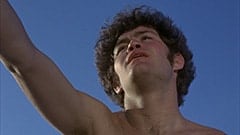
[Movie: Micky is in the desert, walking towards the camera.]
(0:18:18) Peter:
I actually think this sequence of Micky and the Coke machine is one of the… better things that ever happened on this movie. And Micky, of course, is brilliant. [Peter laughs.]
[Movie: Micky beats up the Coke machine.]
(0:18:35) Micky:
This is a part of me that really exists, you know. Um. I’m well-known — and this — Jack might have even seen me do something like this at home when, you know, I banged my head on a cabinet, or a telephone wouldn’t work, or something happened with a mechanical object — with me, it’s always a mechanical object — and I’ve been known to smash telephones with sledgehammers, ’cause they wouldn’t dial. Play [Micky laughs.] You know, you have to teach these mechanical objects a lesson. You can’t let ’em get away with this, you see, or they’ll come after you every time.

(0:19:07) Micky:
God, look how skinny I am! This, uh, desert sequence, of course, does not take place in, uh, in the desert. Well, it does, but it’s the desert near Palm Springs. And just behind the camera, you can’t see it, is a housing development, and I guess the developers had sold the houses during the off-season, or the, the non-windy season, and they put up a berm of trees and stuff like that, but what had happened is, Playyou don’t stop the desert with, you know, some shrubbery. And so, what had happened is that all these people, like a few years later, were living in sand dunes built up around the edges of their homes and moving out. I don’t know if anybody’s still living out there to this day, but, uh, it was kind of tragic, I mean, ’cause, already, this is back in, you know, ’69. I think they built it in the ’50s or something like that, and only the real hardcore people were, were sticking around, ’cause sand was just everywhere.
(0:20:14) Mike:
There was the, the joke where the Arab rides up on the horse and goes “Psst!” and then runs up and goes “Psst!” It was a joke I had just heard, so I told it, and everybody laughed. How, why it ended up in the movie, I had no idea, but. Bob and Bert and Jack really sort of led everything along those lines, and, and we just spewed, I think, off in the corner. [Mike laughs.]
(0:20:37) Mike:
And then after that… you know, it was, it was driving around in the golf carts and smoking a lot of grass and just… you know… acting… acting twenty-five years old, or however old we were at the time. Crazy stuff.
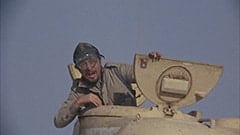
[Movie: I. Vitteloni emerges from the tank.]
(0:20:54) Davy:
I think this where the minds of, uh, Jack Nicholson and Schneider and Rafelson, I think this is where they took over, because this was never… this was never something that I remember writing or being part of talking about. But, you know, Bob Rafelson told me once that a lot of the stuff that he thought about on different things — he used to watch midnight movies — he’ll get ideas. What is original? You know, even here, you know, the joke about, you know, Italian war heroes, you know. I mean, what do you put on the second page? [Davy laughs.]
(0:21:34) Micky:
So a lot of these things were just joke-jokes. You know, I mean, again, clichéd Hollywood jokes, which the movie is made up of a lot of them. I think a lot of them go over a lot of people’s heads, especially nowadays. Younger generations probably don’t even get this Italian surrendering gag. And by the way, that was the great Italian actor Vito Scotti who surrendered to me. Lot of great character actors in this movie. And we had some great character actors on the show too, you know. Jerry Colonna, we had Rose Marie and Stan Freberg and Hans Conreid, who hated us, and I don’t blame him, ’cause we must have been such… such dickheads, but… um.
[Movie: The army has left, and Micky is about to get into the tank.]
(0:22:14) Micky:
You know, this obviously for me, was like a very dramatic scene, especially that early bit. And I was a little bit, um, nervous about it, you know. I hadn’t done any kind of drama like that in Circus Boy. Well, I had a little bit as a child actor at ten years old. Bob worked with me on that for a while, you know, that, that drama, to make it as, you know, real as possible and not too over-the-top and… these characters are based on kind of our real personalities as opposed to, like I said before, the wacky Monkee kind of characters. So I remember feeling, um, I was nervous about that. That was probably the, the toughest sequence for me to do as an actor, but now, I’m very proud of it.
[Movie: Micky blows up the Coke machine.]
(0:22:59) Micky:
[Micky laughs.]
[Movie: “Can You Dig It” starts.]
(0:23:02) Peter:
And up comes… “Can You Dig It?” A song of my own composition. Which, I didn’t think of as middle Eastern in style at the time when I wrote it, but, uh, it does have kind of a, a Arab tone to it. That, um, flat second degree Play[Peter hums the song] that gives it a Arab sound. North African or Middle Eastern.
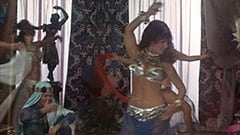
(0:23:37) Davy:
But, you know, where it came out of, I dunno. We blow up a Coke machine, and all of a sudden, we’re in a tent with dancing girls? Typically Monkee. But you know, we’re in the desert, and there we are, you know. In the beginning, we’d had the girl come in, you know, and filmed through the fish tank, and then, you know, all of a sudden, well, you’re in a desert, so this is… typical… desert behavior, one would imagine.
(0:24:05) Peter:
PlayI thought I would, uh, get lucky with one of these women, but none of them came through. [Peter laughs.] Actually, they were all intimidating as hell.
(0:24:18) Mike:
PlayI think Peter’s songs are the best songs in the movie. You know, they were just… beautifully put together, and this, and then that song, “Can You Dig It?” being around those beautiful girls doing those belly dances and those cymbal dances and stuff. I was just… beside myself, you know, with, uh, with lust and passion and, uh, kept making these cheesy sleazeball passes at them. PlayOh my lord. If I could go back to every one of them and send them a box of soap, I would. But the set was beautiful, and the women were beautiful, and they could really dance. I was just, I was in heaven watching all that stuff going around. I wasn’t smoking any dope at that particular time, but, uh…
(0:25:00) Micky:
This was a beautiful set that, uh, they built on the stage. It was the same stage we were using, you know, for the show. And, um, you know, I sang the song, obviously, but the girls did most of the dancing, and we just sat there and kind of… wallowed… [Micky laughs.] To be honest, I’m not sure who envisioned these, uh, music videos. ’Cause obviously, these were full-blown music videos, but I, um… I suspect it must have been Jack. And Bob.
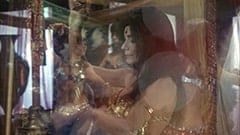
[Movie: Helena Kallianiotes dances.]
(0:25:32) Micky:
But that girl right there is Helena, who, um, uh, was a friend of Jack’s, and she opened a night club in Los Angeles, uh, I guess in the ’80s, ’70s or ’80s, that became a very, very hot spot in Los Angeles.
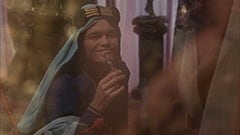
[Movie: Micky smokes a hookah pipe.]
(0:25:48) Micky:
PlayAnd for those of you wondering, no, there was nothing in the hookah pipe; it was just a prop.
(0:25:55) Micky:
There’s a lot of really great special effects, like all these layers of, uh, multiple layers here. These days, of course, you can do this by just pushing a button on a computer, but back then, this kind of special effects took a long, long time.
[Movie: Testy True says, “Quick. Suck it before the venom reaches my heart.”]
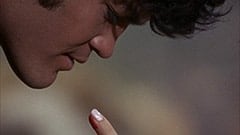
(0:26:12) Micky:
There’s a special effect for you.
(0:26:15) Davy:
Yeah, Teri Garr. Okay. I mean, she was like, you know, went on to do a number of movies, and, uh, she was always surprised when, when people always went back to, “So, tell us about the Monkee movie, Head”, you know. So in the ’70s and in the ’80s and when she was working quite often, she told us that, you know, “Why do they keep asking me about this movie? I just had one little part in it,” and I was like…
(0:26:39) Peter:
We have here Teri Garr in her first feature role as a movie actress. Our friend, Zal Yanovsky, later of the Lovin’ Spoonful, used to call her “Teri Garr, the Movie Star”, and I thought she was excellent in this. And I always thought that she got herself involved in roles very ill-suited to her ability.
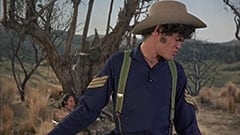
[Movie: Micky kicks Testy True.]
(0:27:06) Micky:
Me kicking Teri Garr. [Micky laughs.] They dressed me in an F Troop uniform. I think it might actually been from the wardrobe department of F Troop. That was on purpose. And of course, Mike is Daniel Boone.
(0:27:19) Davy:Well, I think Micky Dolenz does an excellent job of acting in this movie, and it just shows that his experience comes through, and, uh, he knows the camera, both sides of it, so. He, he was, you know, already schooled in, in the diplomacy, and he knew what he was doing.

[Movie: The camera pans down to Davy playing the violin.]
(0:27:43) Micky:
This next sequence here is a reference to that movie, uh, Golden Boy, which again, I doubt if any, you know, kids seeing it this, uh, at this time, uh, would know. That looks like Natalie Wood. And there’s the lovely Annette Funicello. PlayBoy, did I have a crush on her when I was a kid. I remember telling her on the set, saying, “Boy, did I have a crush on you.”
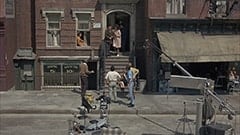
[Movie: A dog barks and runs through the set.]
(0:28:12) Davy:
Someone let my dog go, and it sorta… came looking for me. Where is he? That was my dog named Sue. It was a male, but.
[Movie: Lord High ’n’ Low says, “I’m too old for excitement!”]
(0:28:23) Mike:
Tim Carey was really a good time. I remember him, uh, being all over the place. He was this huge, large figure. I mean, he was physically big, but I’m talking about, you know, just spiritually, this — he just sort of took the place over.
(0:28:38) Micky:
I think Timothy Carey here kind of represented merchandising, distribution, the whole marketing of the Monkees. And, you know, representing… greed, and I mean, the reference he’s making there, whether you notice or not, is selling Monkee… bodily fluids… [Micky laughs] and other disgusting things, uh, as, uh, merchandise.
(0:29:13) Davy:
I think the Monkees TV show was the first independent full-time show that they were shooting on Columbia Screen Gems lot.
(0:29:21) Peter:
PlayDavy Jones drove up to the barrier, and was told that he wasn’t going to be allowed on the set. This was before we’d, the show went on the air. And the guard told him, “We don’t allow long-haired kids.” Davy says, “I work here.” And the guard says, “That’ll be the day.” David says, “Raise this barrier, or I’m driving through it.” Guard says, “It’s the last barrier you’ll ever drive through.” Davy punches it [Peter laughs] and kept the shattered wooden barrier on his wall for years afterwards.
(0:29:48) Davy:
This image of us going to the commissary, which is the cafe at the studio, was, you know, the way we felt. It’s not actually what happened, you know. All of a sudden, you’ve got four long-hairs on the studio lot, four young guys who have their own TV series, you know. Usually, it was handled differently, so. We felt a little distant from everybody else. Everyone waves and says, “Oh, there’s those Monkees. Oh. Well, that’ll last five minutes.”
(0:30:21) Micky:
And this part here, there’s actually some truth in this, you know. When the Monkees started filming on the set, of course, television and, and the business was much, much different at the time, and, um, everything was very — a lot more formal, and you never improvised really, and it was all very scripted, and, uh, of course, we came on the set, and, to our credit, Bob and, and Bert and different directors of the show, and, uh, Jim Frawley had heavily encouraged us to improvise, and so, the problem — well, the beauty of that is of course, you get great improvisation, which I think contributed a lot to the success of the show. The downside is that you end up with us improvising all the time and then freaking out, and, like, Bob having to shut the set down a couple of times, ’cause we were just bouncing off the walls, which they had encouraged. I’ve often likened it to a, a nuclear reactor, which you have to keep a, a lid on it, or it will burn a hole through the center of the earth. Or if you constrict it too much and control it too much, you put the fire out, and that’s kind of the challenge, I think, that Jim Frawley and Bob and Bert and everybody on the, on the show and the set had, is that how do you keep us on our toes and fired up and improvising and being silly and coming up with crazy stuff without us literally bouncing off the walls and imploding?
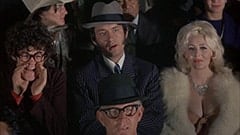
(0:31:42) Mike:
You know, I didn’t really understand acting, and, uh, I had to play a mobster or something who was supposed to be, uh, using Davy as a fall guy or something. And you have to understand, I had no cultural or literary reference to that dynamic at all. The little education that I had, I didn’t pay any attention to, so I didn’t even know what this guy was supposed to be doing, why he was saying what he was saying to Davy. Why would he say to the guy, “Stay down”? That’s how naive I was. That’s how little I understood about what was going on. So I, I went to Jack, and I said, “What is going on here?” and Jack kind of treated me like I was being disingenuous. He said, uh, “Oh, come on, you know what’s going on. It’s the guy, you know, he’s running the game, and you know, you wanna be a tough guy.” And I said, “Well, Jack, I don’t know how to be a tough guy. I don’t know what to do.” And so, he kind of showed me. Uh, he gave me, you know, some acting lessons.
(0:32:41) Micky:
I had so much fun filming this stuff, because in a way, you know, we got to play characters, even on The Monkees, we would do this, and it was always, you know, a little bit, uh, Monkee-esque, but in some of these sequences, you know, we really got to do some, I think, you know, some interesting acting and playing characters, you know?
(0:33:02) Davy:
And, and, you know, obviously, that Annette Funicello thing, you know, Play“Davy, don’t, please, please, don’t!” Typical Annette Funicello, you know. Sorta like trying to take care of everybody, and, Mickey Mouse Club stuff.
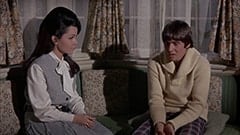
[Movie: Davy talks to Teresa.]
(0:33:18) Davy:
I had that sweater for years, but I don’t know what happened to it. It’s like… two sheep it took to make that. That was heavy. PlayThe pants, well, pretty… [Davy laughs and puts on a Scottish accent] pretty Scottish, there, you know. I don’t know what you’re talking aboot.
(0:33:41) Micky:
I don’t think that you can literally, you know, uh, pin any particular character on us. I mean, there’s parts of all of us in every one. And I think what, uh, the brilliance of what I think Jack did was pull out, you know, those kind of elements that are, that are true to everyone. Everyone has a bit of a fighter in ’em. Everyone has a little bit of a conman. And I think that was part of the brilliance, that Jack, you know, just sort of pulled out these little elements of each of us, and the boxing scene, you know. Davy did do some fighting, I think, when he was younger.
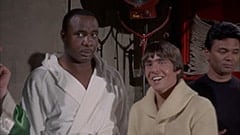
[Movie: Davy chooses Sonny Liston to fight.]
(0:34:16) Mike:
Sonny! Yeah. Interesting, being around a guy like that. Near as I could tell, he was in a fog. [Mike laughs.] PlayHe didn’t know where he was or what he was doing; he just knew he was supposed to beat up Davy Jones. I think that was it.
(0:34:32) Peter:
Davy did great in this. Sonny Liston was, uh, just like Ray Nitschke. Dour, uncommunicative, did a good job, told what to do, did it just right. Carol Doda sitting next to Mike. The first great silicone implant queen. Sweet girl.
(0:35:00) Peter:
I think we shot this downtown L.A. at some gym (The boxing scene was filmed at Grand Olympic Auditorium in L.A.). We shot the scenes that took place in the Monkees, uh, house, were shot in the same, uh, set as the TV show, and — Micky knocking everybody down. About ready to do in — Playoh no, oh no. Carol Doda. Carol, my darling. Let’s just have a little stroll across the ring here, and let me reach down, and BAM! Down you go! And I’m not the dummy.
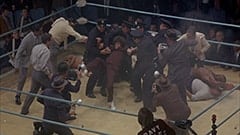
[Movie: Micky has a temper tantrum in the boxing ring.]
(0:35:32) Peter:
All of this is about Micky’s not the dummy. Micky is not the dummy. Micky, “I’m not the dummy! I’m not the dummy!” And in, in the lower right hand corner…
[Movie: Peter appears in the lower right hand corner of the screen.]
(0:35:45) Micky:
I had trouble with this particular scene. I don’t know why. I felt uncomfortable for some reason. I don’t know, maybe it was, you know, Olympia Stadium, it was the time of day, yada yada, I don’t know. But, um, I had trouble with that. And that, of course, was the reference to the fact that Peter, on the television show, played, of course, the dummy. And he was far, far from being a dummy. And, um, so we used to make jokes about it, and in this film, you get to actually see Peter a little bit more like he really is, you know, uh, and his real personality.

[Movie: The movie crew walks through the diner set.]
(0:36:27) Davy:
Oh, wow. Bob Rafelson. Jon, uh, Jon Anderson, our assistant director. Jack Nicholson in his flowered shirt.
(0:36:40) Micky:
Boy, I’ll tell you, that guy, Jon Anderson, he’s responsible for keeping, keeping, uh, it all together. We went through like half a dozen assistant directors, you know. [Micky laughs.] I think a couple of them died because we were nuts. Jon finally — there’s Dennis Hopper, wow — but Jon, that guy right there, Jon was so responsible for keeping us together, and he became our friend, and we trusted him. Again, you know, part of our generation, you know, just probably a little bit older than us.
[Movie: Peter expresses his concerns to Bob about hitting a girl in the movie.]
(0:37:12) Peter:
This is a little bit of self-awareness on Bob’s part, where he gets that, you know, here’s this kid, and just going off the deep end about one thing and another.
[Movie: Davy says, “Sure, it was great.”]
(0:37:23) Peter:
Play“Sure, it was great.” And yet… Peter walks out, and people see him, and, you know, he hits women; I don’t know if we wanna hang around him. PlaySo I sit down, and I overplay the scene a little bit… not too badly.
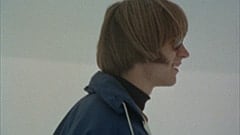
[Movie: “As We Go Along” starts.]
(0:37:52) Peter:
Well, then comes “As We Go Along”, I believe is the name of the musical number. And we start with me in Alaska! Where I went up — at that point, we had already shot — this is post-production shooting — PlayI wanted to go out, uh, wearing my beard. Bob wouldn’t hear of it, so I deliberately cut my sideburns back like Stephen Stills. This is my homage to Stephen. Stephen, if you’re watching this: hey, pal, I’m thinking of you. This is the way Steve wore his sideburns, and in fact, if you look at this picture of me and Stephen at the same time, you will have a hard time telling us apart. In fact, it was our experience together — Steve and I — that, uh, we were lookalikes on the Greenwich Village stages, and when Stephen first met Bob, Playhe was told that he would probably be great for this part, except that his hair and teeth were not… telegenic. And did Steve know anybody who looked like him, who had one tenth his talent, and whose hair and teeth were probably more photogenic, and he thought of his old friend Peter, and the rest is a hysterectomy.
(0:39:00) Micky:
Again, a Carole King tune, written with Toni Stern. One of the most beautiful tunes, and, um, on the guitar are Ry Cooder and Neil Young. Listen to this track. I mean, it’s just unbelievable. And when I went in the studio — again, you know, I probably got the song the day before, something like that, and went in studio, and this song is in 5/4 time parts. I’d never sung anything in 5/4 time. The only thing I’d ever heard in 5/4 was Dave Brubeck’s “Take 5”. And, um, Carole spent quite a bit of time with me, you know, getting me to sing it, uh, in 5/4 time. I, uh, always was very grateful to her for that.
(0:39:44) Mike:
Bob called it an interlude. He said, “You know, the thing is so manic and so hyper and carrying on so much; we need this interlude.” And I thought… why? What are people gonna do during an interlude [Mike laughs] in a movie that’s moving at this pace? But I didn’t say that to him, and I don’t think I could have articulated it at that point. I just thought, well, okay. PlaySo, you know, in typical, you know, Nez kid fashion, the only thing I could think about was, “How do I look?” [Mike laughs.] It was all just, you know, about me, and, um, I never understood the whole sequence anyway, so, you know. I guess people just wanted to linger kind of over the Tiger Beat images.
(0:40:24) Micky:
PlayThis is Alaska. You can see Russia from there. (This is likely a reference to a quote from Sarah Palin in 2008.) [Micky laughs.]
(0:40:35) Peter:
PlayHow’d I get to Alaska? I turned left in B.C. (This is likely a reference to a quote from John Lennon in A Hard Day’s Night (1964).) That’s all there was to it. That’s just where Bob took me. Uh, I don’t know where Davy and Micky went.
(0:40:45) Davy:
Could be four boys living anywhere. So they get ’em in the sunshine, they get ’em in the four seasons, and you know, it was never really disclosed as to where.
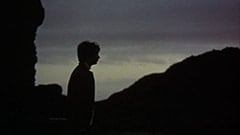
[Movie: Mike walks on a beach.]
(0:40:55) Peter:
I’m pretty sure this is, uh, Carmel, Big Sur. Probably what drew Mike to that place after, uh, maybe what introduced him to that part of the world. It’s a glorious part of the world. I like this song too. It’s nice, the, uh, Carole King’s musical genius, bars of five, swinging into a, into a straight through, and then… PlayTwo, three, four, five, one, two, three, four, five, one. Like that.
(0:41:27) Mike:
I love the way the scenes just sort of wandered into each other and were completely impressionistic in that regard. Almost, you know, cartoon-like. I thought that was inspired. But, um, I could not really tell what was gonna happen from the script to the screen. Just didn’t have that skill set, then, and, uh… I do now, but I didn’t then, so I didn’t, I didn’t know what was gonna happen.
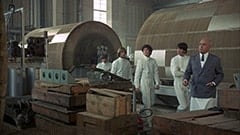
[Movie: Inspector Shrink leads the Monkees through the factory.]
(0:41:54) Micky:
Now we’re down here at the sewage treatment plant in Playa Del Rey. Very appropriate. [Micky laughs.] This is obviously a slap at, uh, you know, industrialism and the treatment of, of workers, you know. PlayVery symbolic stuff. I’d love to know what in the world Jack was thinking when he wrote some of this stuff.
[Movie: While walking through the factory, Davy notices the workers, who are actually mannequins, when one of their heads falls off.]
(0:41:20) Peter:
And Davy is the only one who notices anything wrong. Now, why… it’s interesting, because I was never aware of this in Davy. Bob and Jack must have thought Davy’s got an awareness that the rest of us don’t have. There’s something wrong here, and the rest of us weren’t paying attention. Um, and clearly, whether Davy noticed anything else or not, I certainly wasn’t paying attention, ’cause I didn’t notice that Davy noticed anything wrong. And he wants to talk to me about it because… PlayI’m pretty much his best bud among the four of us. We sort of lined up that way: Davy and I on the one hand, and Micky and Mike on the other.
[Movie: The Monkees walk into the black box.]
(0:42:07) Davy:
We had a black box that was at the back of the studio. We went out the back of the studio door, and we went into this black box. It had a meat freezer handle on it, and it was soundproofed completely. There were four lights, one in each corner of the room, and it had our names underneath it, so if they want us on the set, they would flash us, and we would go out of the black box. We’d have our guests ushered around to that black box if we had any on the set. And so we were very noisy. We had four cabins on the set to start off with, but it was very difficult to keep four guys… quiet, you know, when they’re not working, you know. Sometimes you walk out your door on the, on the set, and you’re not thinking, and you’d say, “Hey, can I have a—?” or “Where is the—?” and you’d go, “Oh, oh.” “Okay, let’s set that one up again.” So they moved us to the back and slowly moved us out the door.
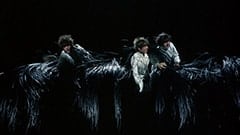
[Movie: The director tells the Monkees to be dandruff.]
(0:44:02) Mike:
The main direction had been, “Okay, guys. Fool around. Be dandruff.” It’s like, “Be dandruff?” [Mike laughs.] How do I be dandruff?
(0:44:13) Micky:
Well, I actually had met Victor Mature on the set of one of my father’s movies (Possibly Timbuktu (1958)) when I was a kid. Uh, he didn’t remember me, I don’t think, but we, we did chat about it, because he remembered the movie, and I can’t recall the name of it at this point, but…
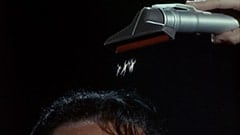
[Movie: The Monkees are being vacuumed out of Victor Mature’s hair.]
(0:44:26) Davy:
Not quite sure what’s happened with that. You know, it was — the idea was to get down, see how small we really were, and you know. We were dandruff in Victor Mature’s hair. He’s so big, and he’s so bold, and so international, you know. Being swept up in a vacuum cleaner out of Victor Mature’s hair. It means you’re meaningless; you’re just a piece of fluff.
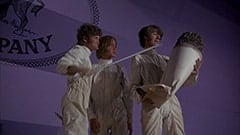
[Movie: Micky, Mike, and Peter are in the vacuum cleaner.]
(0:44:50) Peter:
And we come to a scene that causes a little bit of contention in the course of making this movie. Michael finds… a roach. We wanted to say, Play“Oh, look! A marijuana cigarette!” And Bob said, “No, no. It’s gotta be ‘el zumo’.” Which is what happens. Micky pokes the thing and says, “El zumo”. And we thought saying “Oh, look! A marijuana cigarette!” was far and away the hipper thing to say, which I still think it was. And I think Bob was concerned about, uh, you know, just saying “marijuana” on a movie was enough to get us… get us in trouble.
(0:45:33) Mike:
It did not dawn on me that that was supposed to be a roach, until after the scene was over, and… Playlisten, I was out of touch with almost every scene in that movie. I just never knew where I was most of the time. Not because of any drugs, just because of being so… you know, ignorant.
[Movie: “Daddy’s Song” starts.]
(0:45:57) Micky:
And this song, of course, written by my good friend, who became my very, very dear friend, uh, Harry Nilsson. He actually had his first hit with us, called “Cuddly Toy”, and then, when the movie came along, he, um, had written this song called “Daddy’s Song”, and it is just a fantastic tune. It’s a little bit about his life, and, um, it’s a great dance sequence. Davy has done this on stage a bit, a couple times.
(0:46:27) Micky:
Yeah, Harry Nilsson became a very, very dear friend of mine, and… we, uh… we used to hang out and… I remember going to the famous, like, Troubadour one night, and I think we spent two years there that night. [Micky laughs.] Yeah, that was the Hollywood Vampires: Harry and Alice Cooper and myself, Keith Moon. It actually started out as a softball team that Alice had put together, and then it just became kind of this, you know, bunch of guys, and we’d hang out at the Rainbow or different places.
(0:47:06) Mike:
The depth of Harry’s songs, like in “Cuddly Toy”, like in “Daddy’s Song”, like all those songs, you know, and even The Point. They had such edge to it, and I think, you know, when Davy did it, it put it into a different space. It put it into that kind of Broadway musical, uh, cute Davy Jones of the Monkees space, and, um, you know, there were a lot of things like that in the movie where I thought it could have been very, very hard-edged. And I think that they backed off from that a little bit because of the Monkees’ teenage image. PlayYou know, our fans were between nine and fourteen. Except these were pretty hip nine and fourteen year olds, I’ll tell ya.
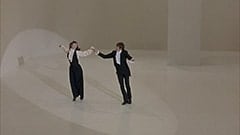
(0:47:49) Davy:
Toni Basil of, uh, Play“Hey Mickey, you’re so fine, you’re so fine you blow my mind, hey Mickey!” and, uh, she just staged, you know, a couple of seasons ago, Bette Midler’s new show in Vegas, and she’s a pretty natural dancer. It was easy working with her. The only thing that I would change about this is I’d take the lifts out of my shoes. I’m dancing like Jimmy Cagney, you know, half the time.
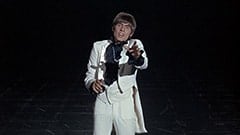
(0:48 :18) Peter:
And the scene stops, and Davy sings live onto camera.
(0:48:26) Mike:
PlayThat was a heartbreaker for me. I really, really wanted to do that dance sequence. And by the way, I still do. [Mike laughs.] I wanna do that dance sequence! I wanted to take the dancing lessons. I was crazy about Harry. Uh, he was, uh, you know, the real thing, and he was a great friend and partier and so forth. I love the song. It had all those terrific Nilsson beats to it. But I was all ready to do it. I was ready to get out there and samba and boogie ’cross the silver screen, and wanted to do it so bad, and Bob had said, “Okay, great. We’ll do it.” And I was just over the moon. And then he said, “No… I’m gonna want Davy to do it, because Davy’s a song and dance man, and he can really pull this off, and…” PlayWell, it broke my heart, but you know what? He was right. Davy is the song and dance man. For me, it was an aspiration; for him, it was a vocation.

(0:49:20) Micky:
And there, of course, is the infamous, famous, wonderful Mr. Frank Zappa, who… I had been a fan of at the time, and when I found out that he was actually a fan of the Monkees. He did the television show, and, of course, he did this movie. PlayFrank is one of those people, you know, of our generation, of that time, that got it. He got what the Monkees was all about. And appreciated it. Um, a year or two later, Frank called me up and asked me to be the drummer for the Mothers of Invention. And, I was obviously very flattered. I’m not sure I could have pulled it off [Micky laughs], but, he asked, and the record company, my record company wouldn’t let me out of my contract.
(0:50:04) Davy:
I’d met Frank Zappa, uh, in the Canyon (Likely Laurel Canyon), and, um… you know, he was pretty laid back. Very quiet kind of person. [Davy laughs.] He was Sid Vicious on Valium, you know.
(0:50:16) Mike:
I think Frank, he was playful, and he squirted seltzer, and he made trouble. Uh, but he did have a barb. He did have an edge to him. That’s one of the reasons I asked him to be on the show to begin with, was here’s a guy out there who is ready to… pull out an Uzi and take us all out if he had half the chance. This was, of course, in revolutionary times, so let’s just, let’s just bring him in here and see what he has to say. That’s how he got into the, into the mix of things, and, um, then he, um, became enamored of it, and he became a part of the, part of what was going on there, because he saw how smart Bob and Bert, Nicholson and those guys were. They were doing all this work, Frawley and so forth. And I think his place in the picture is just exactly right. You know, he’s the arbiter of hip. He has that, uh, sarcastic put-down quality to his line readings that really typified what the press was on about doing. Frank served his purpose well. The, the character of Frank and the cow.
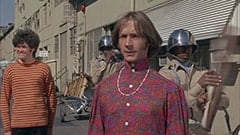
[Movie: The Monkees are being escorted by men in uniform.]
(0:51:24) Micky:
Yeah, right now, we’re on, uh, on the lot again at Sunset and Gower. There’s the commissary on the right. Other stages on the left. Wardrobe — uh, the first day, uh, I remember meeting, uh, Mike and Peter and David formally was right on this little street here, just — right about there to the left is the wardrobe department — and I remember walking up, and, you know, saying, “Oh, hi, I’m Micky”, and “Oh, I’m Peter”, “Hi, I’m Davy”, “I’m Mike”, “Oh yeah, I remember you from —” I remembered Davy mostly from the auditions, ’cause we had a lot in common. You know, we had, uh, been child stars and actors and stuff, and they paired us up, like, early on, so I think the chemistry there obviously was, you know, working.
(0:52:07) Peter:
I think of the four of us, Davy was actually the best prepared, best dedicated actor. Somehow or other, he was the one who has always given it his all.
[Movie: Peter walks into the bathroom humming “Strawberry Fields Forever”.]
(0:52:25) Peter:
[singing under his breath] “Nothing to get hung about…” I just decided to whistle that, “Strawberry Fields Forever”, for the fun of it.
(0:52:33) Mike:
I knew they were talking about how avant garde and wild and off-the-meter this, the whole thing was, but I didn’t have any, you know, frame of reference for the TV shows, and certainly not for the movies, and psychedelia was part of the landscape at the time. You know, the hallucinogens were going around, from LSD to, to peyote to all the other stuff that was being passed back and forth. So it didn’t seem, you know, out of whack, and it certainly wasn’t off-putting to me in any way. I just, uh, as I look back on it, I just, I frankly just kind of didn’t get it, and didn’t understand the process that we were in.
[Movie: Peter says, “Nobody ever lends money to a man with a sense of humor.”]
(0:53:09) Peter:
Play“Nobody ever lends money to a man with a sense of humor.” I have no idea what that’s about. What… Bob and Jack meant by that. What the significance of it was.
(0:53:24) Davy:
The directing, uh, of Bob Rafelson, you know. I mean, later on came, uh, King of Marvin Gardens and Five Easy Pieces or whatever it was. You know, our show was not the show we sat down saying, “This is your motivation. You have to really put this across and project to the audience,” you know. So he was more or less, you know, “Okay, camera over here, that’s it, gonna shoot that there, go ahead, you say that, David, and you go here,” and it wasn’t like, “Now, listen, you know, I don’t think we got the right motivation here.”
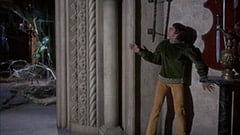
[Movie: Davy wanders through a gothic hallway.]
(0:53:53) Davy:
The shirt I was wearing, I understand, was purchased by Michael Jackson in a theatrical memorabilia auction of sorts. What happened to that haircut? I don’t know. Now it’s… kind of shades of gray, but… here we go. I have the jacket that goes with those pants still.
(0:54:14) Peter:
I think I had a harder time making the movie because, it… everybody invested — first of all, everybody invested the movie with a lot more… weight than we were investing in — you know, the TV show was intentionally very, like, meaningless beyond, you know, the froth. Let’s have a little fun. Let’s make a TV show. Let’s get into some situations we can hang our hats on. Every single hackneyed situation, and — Playthe Manchester Midget Greenie! — every single hackneyed situation we could get into was just an episode.
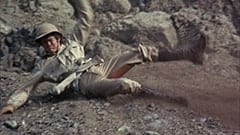
[Movie: Micky falls down a hill after yelling, “The Manchester Midget Greenie!”]
(0:54:46) Micky:
Back in Bronson Canyon. PlayThat is me, by the way, doing that stunt fall. Thank you very much. [Micky claps.] Applause, applause, applause. You know, the comedy wasn’t satirical, and it wasn’t topical, and another element that a lot of people miss is that the Monkees were not successful on the television show. The Monkees were this, uh, out-of-work group that wanted to be the Beatles. You know, the girls were always chasing somebody else, another group or something. We were trying to be famous, and it was that struggle for success that I think endeared it to a lot of kids, and they could, they were able to relate to that, because they were also out there, out there struggling too. And of course, the other funny thing about the show, uh, that a lot of people don’t realize is that we represented the counterculture at the time. PlayI mean, the only time you saw long-haired kids in bell bottoms on television, they were being arrested. And along came this Monkee television show, and to Bob and Bert’s credit, they, they forced it through the system, you know. NBC, I remember being told — I wasn’t there — but I remember that they were kind of worried about the show. They just didn’t like the idea necessarily, and worried about sponsorship, having long-haired kids on television as masters of their own destiny, which was unheard of at the time. Every time you had young kids on a show, they always had a father or an uncle, you know, or somebody that was the authority figure, that was the guardian, that was the adult figure. And on the Monkees, of course, that didn’t exist, which was another reason I think kids really identified with it.
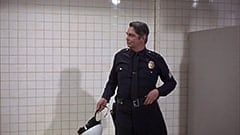
[Movie: Officer Faye Lapid dances in the bathroom.]
(0:56:22) Peter:
Logan Ramsey as Officer Faye Lapid. What on Earth could that mean? T.C. Jones is the other… sexually ambiguous character in the movie. Two of them. Isn’t that interesting?
(0:56:33) Davy:
You know, we’ve all gone through those stages of, you know, being down on the police or, or whatever… but it… I mean, it’s pretty rebellious, a lot of the suggestions that they made in the movie.
[Movie: Victor Mature appears in the bathroom mirror.]
(0:56:52) Mike:
Well, Victor Mature was, uh, I came in one night to, uh, Bert and Bob sitting around the office, and said, “What’s going on?” and they said, “Well, we’re trying to get Victor Mature to come play this part.” I said, “Oh, that’s a great idea! He’s the guy from the… sandals movies and stuff, right?” And they said, “Yeah, he’s got this whole, uh, movie background that would be really great to have in there.” And I said, “Well, what did he say?” And, uh, they said, “Well, we, we haven’t called him. We haven’t talked to him.” I said, “Why not?” They said, “Well, we just haven’t, we just haven’t gotten around to it.” And I said, “Well, you guys seem like you’re afraid to call him.” And Bob said, “Yeah, we are a little bit, Mike. We, we, were, we don’t know the guy. I don’t know the guy.” I said, “I’ll call him,” and they looked at me, and they said, “You will?” I said, “Sure, I’ll call him. Give me his number.” And so… they had it! They had his home number there with them in the office. So I picked up the telephone. I called. He answered! And I said, “Mr. Mature?” He said, “Yes?” And I said, Play“This is Mike Nesmith. You may not know who I am, but, uh, I’m one of the Monkees on television,” or something like that. He said, “Uh… yeah… yeah, I, I know your show.” I said, “Well, we’re doing a movie, and, um, we’d like you to come play in this movie.” Well, Bob and Bert thought I was doing just my one side of the phone call, and he wasn’t really there. And they started going, “Oh, yeah, right, come on, Nesmith. You’re so full of it. Put the phone down. Don’t be such a jerk. He’s not there.” I kept waving and telling, Play“Shut up! Shut up! I’m talking to Victor Mature on the phone here!” And they were, “Yeah, yeah. Never in this lifetime. Come on, man. Hang up the phone.” And then finally, I said, “Well, hang on, Mr. Mature. Let me, uh, let me give you, uh, Bert Schneider who is, uh —” or Bob, I don’t know, one or the other, “— who’s, who’s right here.” So I handed the phone over to them, and they just both just went totally silent [Mike laughs] and started, started talking to him, and they obviously made the deal with him.
(0:58:48) Mike:
You know, he was perfect. He was a 1940s, ’50s movie star. He had that whole thing about him, and he was, uh, he was a pleasant sort. You know, I didn’t get to know him at all. He was just there, and he just came and did his thing.

[Movie: Mike moves through the pad in slow motion.]
(0:59:01) Mike:
Those Tiffany lamps on the sets, and, when I, when I came in to see the Monkees pad re-made in Bob’s pop art, contemporary art image, I just thought it was breathtaking. I didn’t have the good sense to go up to him, you know, kiss him on the cheek and say, “I honor the light within you,” because… I just didn’t. But one of the things that really stuck out to me was that Rafelson wanted to use the contemporary art scene as, um, a pool. And we went to the Chicago Museum of Art, and, uh, that’s where I saw the, the Kienholz car, and, uh, the floating, uh, Mylar balloons that are in the movie, and those kinds of things, and, uh… that visual art, that whole performance art side of things intrigued me and appealed to me. I thought it was beautiful, and, and when Bob started talking about putting these various things into the picture, into the movie, uh, it was captivating to me. I had no idea how he was going to integrate it, and I think he did put it in there in really a beautiful way, but… that was more striking to me than any film, um, references.
[Movie: Mike enters his surprise birthday party.]
(1:00:19) Davy:
If anything, you know, the whole idea of the Monkees was, um, fun, and you know, sort of fantasy and… unpredictability. You know. Mike didn’t like surprises. He liked it all in black and white on paper. He wanted to know what the deal was. You know? He wasn’t a guy that was into drugs or alcohol or… you know, he was musician.
(1:00:52) Micky:
And this is a little bit like Mike; he never did like surprises.

[Movie: “Long Title” starts.]
(1:00:58) Micky:
Another great song Peter Tork wrote here. This was a crazy day of filming. This was a great party. There’s the Kienholz car. I don’t know how they got that.
(1:01:09) Peter:
Back Seat ’38 Dodge by Kienholz was a very dramatic and off-color and subversive work of art. Um, it kicked up a fuss when it was first, uh, first installed. A lot of objections to the, uh, raciness. I think that the couple were… partly nude. Apparently, there was some overt sexuality to the nudity, which was… that was asking too much.
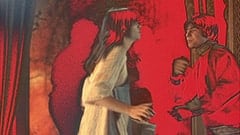
[Movie: There are special effects during the party sequence.]
(1:01:36) Mike:
Bob actually explained that process to me. He says, “We’re gonna do something here called solarizing the film, and, uh, it brings out all these colors and stuff around. It’s really fantastic.” And so that’s what we’re doing here. I didn’t know what he was talking about, couldn’t actually visualize it in my mind, but, um, when I saw it, I remembered him trying to explain it to me. And of course, that was the kind of stuff you would see at every single light show that was going on at every single rock and roll psychedelic club, uh, in the country. And so it was just, you know, it was right where it needed to be.
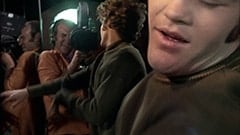
(1:02:12) Micky:
Most of this work here is done in editing, as in most music videos. See, there’s me doing some dancing, there’s David, and Peter, and… you see Bob Rafelson with his camera and other people with their cameras, breaking that fourth wall, which, these days, of course, is not unusual, but back then, it was.
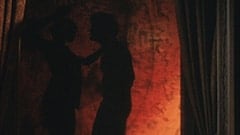
(1:02:33) Micky:
Basically, they did a master, probably two cameras or three cameras of the, of the whole crowd, and then, they would stop and do, you know, just a close up of me, there’s one of Mike, and then they had us behind, um, you know, some screens and… they took a lot of wild footage. But it was always to playback.
(1:02:55) Peter:
The movie came in at, as I understand, for seven hundred and fifty thousand dollars. Three quarters of one million. The equivalent movie now would be, what, eight million dollar movie, or twelve million dollar? Not much. Very, very cheap movie to make, relatively speaking, but that would be, uh, the special effects, and all the rest of it.
(1:03:16) Mike:
That was the Lester (Richard Lester) trick. You know, just throw the music in there, and let the chips fall where they may, and kind of build everything around it. Now, you know, Rafelson didn’t have anything near as powerful as the four Beatles to work with, so… you know, the chips [Mike laughs], the chips kinda fell off into the corner and over behind the refrigerator and places where he couldn’t really use ’em, but, uh, the songs clearly were not integral to any narrative that was going on.
(1:03:47) Davy:
Despite the similarities to the Beatles and A Hard Day’s Night and all the other movies, you know, you’re basically dealing with four guys that didn’t have their heads in the studio at the time. They had their heads in, in the making of a television series, about a band, and so, it was a comfort zone for all of us at that particular point.
(1:03:21) Peter:
Mike says, “The same thing goes for Christmas,” here, but on the soundtrack, Jack Nicholson, who assembled the soundtrack album, put together where Frank Zappa said, “It sounds pretty white to me”, Michael says, “And the same thing goes for Christmas”, back-to-back. Uh, Bert was a little taken aback that Jack played with the soundtrack to that extent, but I thought Jack did a fabulous job.
(1:04:49) Mike:
Jack brought a spiritual, um, element to the proceedings. If there is a magic trick inside Head, I think it’s Jack Nicholson, and, uh, the bond between Jack and Bob was very strong at that point, and their friendship and their working together was very nice for me to see. But Jack Nicholson and I went into the recording studio, and he and I sat there and put together the soundtrack for Head, and he had a lot to say about it. He didn’t know how to produce at all, any more than I knew how to act, but I was able in some way to return to him what his capabilities were, and to watch him, you know, go, to to work creatively. Like he was the guy that came up with speeding up “Ditty Diego - Chant” and slowing it down and putting all those things into it, and not only was it sonically interesting for the times, but it also made a really nice something of a pastiche, which, which wasn’t really done in recording at that time. So it was, it was innovative, and it was cool. It was great to work with him, because he’s so creative, and so, you know, he has just got great ideas.
[Movie: A man says, “Somebody come up and giggle at you, that’s a violation of your civil rights.”]
(1:06:05) Micky:
These interviews here, these, um, man-on-the-street interviews, were done by the, uh, original famous man-on-the-street guy, Mal Sharpe. So they asked him to go out and ask that question, man-on-the-street question, and these are real answers from real people. That’s very clever.
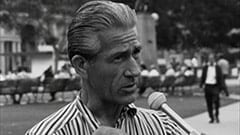
[Movie: Another man says, “I think they should be with fish. And they, that way, they could only prey on fish.”]
(1:06:22) Peter:
PlayThis man makes more sense than the rest of the movie put together. “They should be fish; that way, they could be condemned to swim with other fish.”
[Movie: The same man says, “They might even jeopardize the fish.”]
(1:06:35) Davy:
[Davy laughs.]
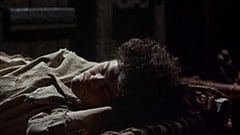
[Movie: The camera pans across Micky, Mike, and Davy in prison.]
(1:06:41) Micky:
And Timothy Carey was a character, I’ll tell you that. He did a lot of strange movies. You know, some of these references here, I think sometimes imply that we felt that we were in a prison, and, and I can’t speak for any of the other guys. I certainly never felt that I was in a prison in the Monkees. But then again, you know, I approached it as a, an actor. I mean, I’d already been in the business for, well, Playmy first series, I was ten. Um, my first screen test, I was six. I have some pre-natal work coming out on ultrasound. You know, I’d been in the business a long, long time, so, you know, I never felt like I was in a prison. I, uh, was very comfortable on the set. I was, of course, thrilled with the, the adulation and the money and the, and the fun. Um, but again, I can only speak for myself. Um, I’d been through the process once before with Circus Boy, which I’d done for like two or three years, and it was a very successful, uh, series, and I’d done autograph shows. I’d done parades. I actually had performed on stage with my guitar doing little concerts. So I never really felt, uh, like a prisoner. At all.
(1:07:52) Mike:
You know, as, as actors and as human beings and so forth, we were victimized, but I don’t think we were victimized any more than people who were on the old Hollywood contract system. We were just a product of the machine, and, uh, you know, the machine spit us out, and did victimize us to a certain degree, but, I just don’t feel any loss from any of that around there, because it wasn’t like they were victimizing me. [Mike laughs.] It was like, you know, it was victimizing the character in The Monkees named Mike, and… they’re welcome to victimize him. You know, they can do whatever they want to him. He was their character.
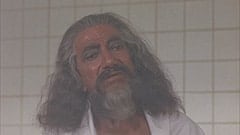
[Movie: Swami speaks with Peter in the sauna.]
(1:08:32) Davy:
This was the first scene that was shot. One interesting factor is that at the beginning of this movie, Peter has some kind of abscess… [Davy laughs] and he came to the set with a swollen face. He, he was out of proportion. We remember when we saw him, we thought, “Oh my goodness. Remind me not to go in a sauna.”
[Movie: Extra says, “How’s about some more steam?”]
(1:08:57) Davy:
Play[Davy laughs.] “How’s about some more steam?”
(1:09:02) Peter:
I think they used insecticide to imitate steam. Smelled funny, man.
(1:09:08) Micky:
Now, during this period, Peter, you know, um, had gotten into some meditation and some transcendental, uh, philosophies and stuff. I had not. I was always a science geek. And I still am. I do remember once experimenting with ESP, you know, but again, as, as like a scientist almost. You know, I would set up an experiment, and, uh… but that was part of Peter’s personality, you know.
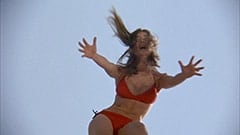
[Movie: The Jumper is on top of the building.]
(1:09:32) Micky:
Yeah, and here’s the famous, uh, girl jumping off the building suicide scene. I’m not exactly sure what this represents.
(1:09:39) Peter:
It’s June Fairchild on top of the building. I saw June Fairchild recently. She is still mightily attractive. She was one of the dancers in the Arab scene too.
[Movie: Micky and Mike bet on whether she’s going to jump.]
(1:09:50) Peter:
Something a little bit awful about those two arguing, betting ten bucks, one way or the other, on whether she’s going to jump. PlayAnd here I am, just trying to be of service, providing the answer! As I have just received it at the feet of the guru.
(1:10:10) Mike:
Well, as you know, it was uniformly panned. But I think that people had been thinking, “Oh, boy, we’ll take these guys out.” There’s a certain just laying in wait, licking their chops. That may be a little more cynical than it should be. I think, I think in terms of, you know, weathering the times and looking back on it now, it’s a good piece of work. Bob has a lot of to be proud of there, and, uh, so do Jack and Bert, and, uh, it’s too bad that it didn’t go anywhere. But I don’t know that it could have, given the time. The marketing of it was, uh, obscure, and, uh, and I think, uh — you know, Bert, who was sort of the business engine behind the whole Monkees thing, had lost his mandate. He had lost his public mandate. Uh, radio wasn’t with him any more. You know, the machine, the Columbia machine, could only do so much, and the film was avant garde. You know, in retrospect, I can see there was a lot of missed opportunities, and… it was sad, but like I say, you know, I was just, I was moving on by that time. It was, I was ready to go make country rock music. You know, Head was the end of it for me.
(1:11:26) Peter:
Uh, I had already quit the Monkees by the time this movie came out (Head premiered in New York on November 6, 1968 (Day-by-Day, p. 549); Peter’s last day as a Monkee was November 27, 1968 (Day-by-Day, p. 566); Head opened in theaters December 4, 1968 (Day-by-Day, p. 569)). Um, nobody seemed to be too terribly upset at me. So I came back to see the movie. We all, the four of us saw it together for the first time, I’m pretty sure. But it was cordial. We were glad to see each other, and, and, uh, you know, and I liked those guys.
(1:11:45) Micky:
I don’t recall a screening, but I do remember this party in New York. Crazy, psychedelic party. And what they had done is put the different reels of the movie on Moviolas, which are these editing machines, and that was how they were having the screening, because the film does have this cyclic, uh, nature to it. Uh, you know, it was once said by someone you could start the movie at any point in the movie and play it around to that same point, and you’d still get the same movie. And so, they had it on these Moviolas, uh. Each reel was just playing endlessly over and over again, and that’s how they kinda screened it for the first big screening in New York City. PlayThat was for the hip-oisie, I call ’em, in New York. It was a pretty cool party, what I remember. I’m told I had a great time.
[Movie: The Monkees are in the black box.]
(1:12:34) Micky:
So here we are, back in the box. Now what the box always represented to me was not so much that we were trapped or imprisoned, but that we kind of lived from one black box to the next. Like, for instance, we’d be on the set, and we’d either be in our dressing rooms, or we’d be in this box that they built for us to keep the noise down. But also that then we’d go from the black interior of a limo, to the black garbage entrance of a hotel, to the black garbage entrance of a concert hall, back into the limo, back into the hotel. That’s always kind of what it represented to me.
(1:13:12) Peter:
We were each trying to get out of the karmic box. There was a box, behind the set on the TV show, which we used to, uh, have lunch and perhaps behave in… some ways which are less than perfectly licit.
[Movie: Peter says, “Where there is choice, there is misery.”]
(1:13:30) Peter:
Play“Where there is choice, there is misery.” Hm. That one never occurred to me.
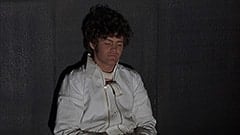
(1:13:35) Davy:
I think the point was made, you know, okay, now, let’s see Mike get out of the box, now let’s see David, let’s see Peter, and let’s, you know… and then me being, you know, sort of naive to the, the cosmic side of the whole idea of the sixties and Playyou know, Hare Krishna, waterbeds, and brown rice, you know. I never really went for any of that. I think this is one of my favorite scenes. I think Micky Dolenz is funny. Micky would fall asleep anywhere. He’d be going along, and all of a sudden — and I used to hate it. ’Cause, you know, we’d go into a restaurant, and he’d put his head on the table in his arms. And like oh, wait a minute. You don’t even put your hands on the table. You know, and he’s got his head on the table, and I’m thinking, “Oh my god”, you know, “People are gonna think that we’re juiced up or…” you know. Be a little bit more considerate.
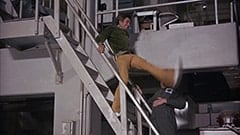
[Movie: Davy kicks a henchman.]
(1:14:23) Davy:
PlayEat your heart out, Tom Cruise.
(1:14:24) Peter:
Boom!
(1:14:25) Davy:
[Davy laughs.]
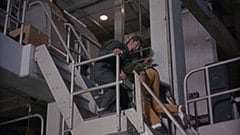
(1:14:26) Peter:
Somebody actually, I think it was this one, this guy — bam — hits his head, and actually suffered an injury at that, in that shot. But he was a stuntman. He knew what he was getting into. Boom! Pow!
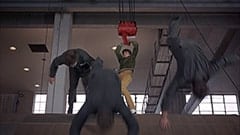
(1:14:40) Davy:
Can’t save ’em all. [Davy laughs.] Oh yeah, I swung on the big red hook. PlayI do all my own stunts, you know. [Davy laughs.] I used to. Now, I have trouble getting out of bed.

(1:14:52) Peter:
Okay, that takes care of that. Now, we take care of Odd Job.
(1:14:57) Davy:
[Davy laughs.]
[Movie: Davy jumps up and drags a guy off a horse.]
(1:15:01) Davy:
Well, this is it. This guy goes acro — oh, watch this guy. PlayBoom! Oh-ho! Oh, dearie me!
[Movie: The Monkees meet Lord High ’n’ Low on a western street.]
(1:15:11) Micky:
Now this, uh, location here is a place that’s, uh, was called Columbia Ranch. I’m not sure what they call it these days (Warner Bros. Ranch). Out in the east valley, there. Couldn’t tell you how many millions of, uh, westerns and television shows have been shot on this lot. It was at the Columbia Ranch — I’ll never forget — we were filming, I don’t remember what episode (“It’s a Nice Place to Visit”), when Sgt. Pepper was released, and somebody got one of the first copies of Sgt. Pepper, and we stopped production, and the sound guy put it through, and we listened to the whole album, there in the middle of production.
(1:15:47) Peter:
Oops! Now, the Big Victor claps his hands, we’re back in the box. The Big Victor, by the way, I think was about a pint and half ahead of the game at all times. As far I could see. Maybe a quart. He was not a bad guy. I mean, when I saw him in the role, it was like, “Who’s gonna beat Victor Mature at the Victor Mature game?” If Victor Mature was a woman, he’d be one of these divas that, like Barbra Streisand and Bette Midler, that just… drives certain people up the wall.

[Movie: A helicopter flies the black box through the air.]
(1:16:23) Davy:
And they actually flew the black box. It was actually… flying.
(1:16:31) Mike:
In hindsight, you know, somebody goes back and says, “Well, it didn’t make any money; therefore, it’s not any good.” But I think at the time, you know, we were all proud of it. We felt pretty good about it. As I look back on it now… well, I still think it’s a good work. If I say it misses anything, I just think it misses the edge that it could have had, that it seems tame to me, uh, given the toolkit that we had. I mean, Bob had some very sharp knives in his drawer, and, uh, I think, you know, had he pulled one or two of those out for Head, it might have had more longevity than it has had. It looks dated to me now, but it still, it’s intriguing. It looks very much of its time.
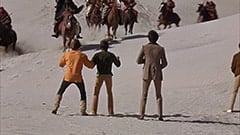
[Movie: The horses charge towards the Monkees.]
(1:17:15) Davy:
Everybody disappeared here, and I was the guy that was dancing between the horses.
(1:17:20) Micky:
Bob insisted that it was us, ’cause he really wanted to see our faces, and, um, it was a bit scary, that. I mean, those were all stunt people riding the horses, and, uh, we did rehearse it in slow motion a little bit, and they were on the end of a telephoto lens, so they, the actual horses aren’t quite as near to us as they may appear. But still, that was not stuntmen doing that. In fact, we did most of them ourselves.
[Movie: The Coke machine explodes. The sheiks yell, “Coca Cola!”]
(1:17:44) Davy:
Oh my god. Coca Cola! Uh-oh.
[Movie: The Big Victor hits a big golf ball that the little Monkees are standing in front of.]
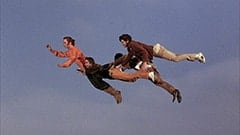
(1:17:52) Peter:
Here comes Victor Mature, playing golf… ah, he had a good shot. And here we are, in aerials. When they make aerials, they give you a, uh, a suit of canvas with a couple of studs hanging off your hips and hang wires on those studs and hang you by the wires.
(1:18:10) Micky:
I, um, had already started directing about this time. I directed an episode of the TV show (“Mijacogeo”), and, of course, making a movie like this, I don’t remember what the shooting schedule was, but it was considerably longer than what we would have for an episode of the television show. This is a ninety minute movie; um, the show was thirty minutes. But the time, uh, taken to shoot a movie, it is much, much longer; we only had three days to do a television episode.
[Movie: The TV shows real war footage, including the execution from the “Ditty Diego” sequence again.]
(1:18:39) Davy:
PlayAnd here we go again. Let’s… turn away another couple of hundred thousand fans.
(1:18:44) Mike:
It is profoundly disturbing if you haven’t ever seen anything like that, which I had not. And… I registered very strongly with them. I said, “Wow. How can you put this kind of image in here? It’s just so awful.” And what they did do was they, they, the image began to replicate and started to do that thing visually that happens orally when you say a word over and over and over and over and over, and it starts to lose its meaning. But they have such power as filmmakers, they just completely destroy you. And I think that’s what happened when I saw that footage; it just destroyed me.
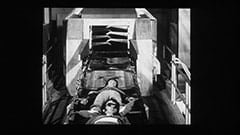
[Movie: The Monkees are tied to a conveyor belt, and the film switches to fast motion and black and white.]
(1:19:28) Micky:
And this obviously, a Keystone Cop, Buster Keaton, Charlie Chaplin.
(1:19:27) Davy:
I mean, there was no, uh, stone unturned here. I mean, they tried to do a lot of stuff, but you know. I mean, I could also see us involved in a number of other things. You know as the working title has always been Monkees Save the World, you know. But we could just as well have made Ghostbusters or you know, used our, our experience to make something else, but it’s kind of surreal in a sense. The whole thing is kind of innovative, and kind of fun. I mean, people see it today and say, “I don’t understand it.” You know, and, “What were you guys smoking at the time?” or… but you know, I mean, how many times do you get a chance to see this guy [Victor Mature] do comedy, you know? [Davy laughs.]
[Movie: The Big Victor is watching himself taunting the Monkees on the TV, and he yawns.]
(1:20:19) Peter:
Victor Mature yawning at Victor Mature. And what do we mean by this? I don’t know. This is too subtle for me. However, Victor Mature kicks in his TV. Oh! Is it the same Victor Mature? We don’t know. And here come the hordes, and conventional escape is impossible, so we have to resort to extreme measures.
[Movie: The Monkees run onto the bridge from the opening scene.]
(1:20:50) Micky:
And here we are, full circle.
(1:20:54) Davy:
Play[singing] “All my life’s a circle, sunrise and sundown.” Yeah, it is a circle, really. So while everybody was busy, thinking about their career, and thinking about what’s gonna happen next, we were stuck in this black box in this circle that always comes back to the same place, and, you know, fortunately, through the experience, Micky Dolenz had gone on to produce and direct Bugsy Malone, and Peter Tork still plays his blues and travels and does the same thing he used to do before the Monkees, and, uh, Mike Nesmith has found his niche in life. He’s a producer, director, writer, musician. I’m, you know, living my dream of America and performing in parks and fairs and Disney World and all the stuff that I do. So I think all in all, you all end up the same, really, so… we put our aggressive familiar personalities into this at the time, but this is forty years ago, so. PlayMaybe somebody seeing this for the first time will say, “Oh! So that’s the Monkees.” Who knows? Maybe the next thing is Monkees Save the World.
(1:22:27) Micky:
Well, you know at the time of course, it was just a part of the Monkee project. I was very proud of the film, especially the work I’d done as an actor. You know, by that time, I was already off into another world, the show had gone off the air. It’d been a very, very intense couple of years of work, and, um, again, because I’d been through the process earlier as a kid, when a show goes off the air, you know, that’s it, you know. It’s like thank you very much, and, uh, nice working with you, and… and I’d already decided to get into directing and producing, and so, it was years later that I saw this, uh, movie for the, for the next time, and, uh, now I look back and I see the movie, and of course, parts of it are dated and kind of… but this movie, to my mind, captures in a way the spirit of that time better than all of those other ones which have become very clichéd. And if you notice, in this movie, there’s no Volkswagen buses with, with flowers on ’em, and… and in a funny way, I think it captures how we all felt at the time. I just want to say, I, um, will always and have always been extremely grateful to, to Bob and Bert for giving me this opportunity.
(1:23:43) Mike:
Bert said, “This is either gonna be a complete bomb, or it’s gonna be a masterpiece.” And, um, I don’t know. That may have been a little bit overstated, but… the only price I’ve ever had to pay for the Monkees is just whatever fool I made out of myself around the edges of it and, and in my youth. Which, you know, they’re prices we all have to pay. And so I’m, I’m happy to have paid those prices. But I should say, I mean, that seems just desserts. But the, the notion that it was gonna wreck the Monkees’ career… I never really understood what the Monkees’ career was. I loved the Monkees, but I never wrapped myself in the Monkees flag. I just always thought it was kinda cool. So this movie seemed… perfectly right to me. I mean, it seemed like it went back over the beats of the career, the arc of it, the start of, you know, where we were all trying to get, and then the, the collapse of it and so forth, and being captured by media. That was all kind of high-minded stuff, and I, I didn’t think there was gonna be any damage from that, and I don’t think there has been.
(1:24:47) Peter:
PlayThe first time I saw this movie, I, I’m not sure I got it very well. It had only been through the years — I’ve seen the movie must be a hundred times by now — and, uh, it’s only recently that I’ve settled on an understanding of the movie. You’re on the set of The Monkees, and you take a snapshot, and later on, you look at it, and you say, “What’s the meaning of this snapshot?” Well, it would have no particular meaning, and I think the movie may have no more meaning than that.
(1:25:17) Davy:
It’s not until all these years later, we all look back and say, “Hey! That was not such a bad experience,” considering what’s happening now in, in television, and so, I think we said what we had to say and got out when we were supposed to, and let’s just look at it as pure entertainment and fun.
(1:25:37) Peter:
PlayAnd I think at the end we have, I.M. [sic] Jefferson, Mimi’s little “ha ha”?
[Movie: Lady Pleasure laughs.]
(1:25:44) Peter:
Good.